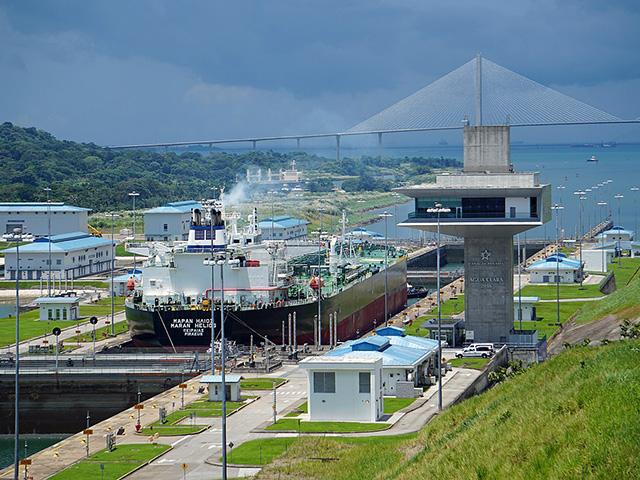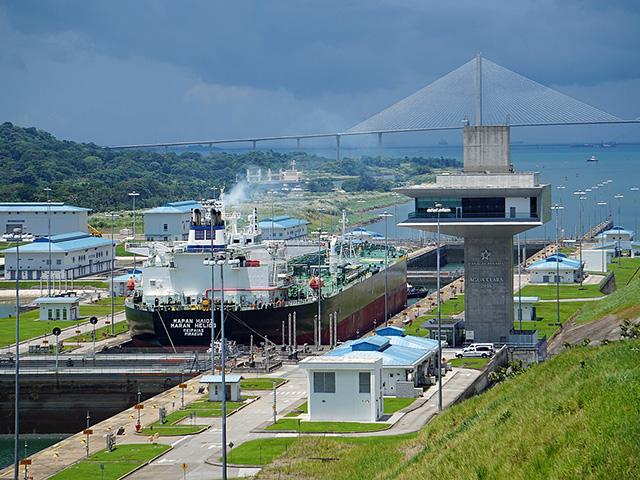Market Matters Blog
Panama Canal Increasing Booking Slots Beginning Mid-May 2024
It's been a struggle for ships trying to move through the Panama Canal since early 2023 due to low water issues from drought. Transit times were long and many shipping companies searched for other ways to move their products. While other routes proved costly, the long delays at the Panama Canal were even more costly.
Some good news came on April 15 when the Panama Canal Authority (ACP) announced in an Advisory to Shipping stating: "Based on the present and projected level of Gatun Lake, the Panama Canal Authority announces an increase in booking slots in the Panamax locks beginning May 16, 2024. In addition, effective June 1, 2024, an additional slot will become available in the Neopanamax locks."
According to ACP, scheduled maintenance work at the Gatun Locks, set to take place from May 7-15, will necessitate a temporary reduction in daily transits from 20 to 17 at the Panamax locks. However, the canal will implement significant increases in transit capacity thereafter, raising the total number of daily transits from 24 to 31 from May 16-31 and then beginning June 1, the total will be 32. The increases come from transit through the Panamax locks rising from 17 to 24 effective May 16-31 and starting June 1, transit through the Neopanamax locks will increase from seven to eight.
The decision to implement these measures follows extensive analysis and monitoring of water resources, according to an April 16 press release.
The Panama Canal relies on an artificial lake, Gatun Lake, which is 85 feet above sea level and fills the locks in the Panama Canal with fresh water to raise vessels as they pass from the Pacific Ocean to the Atlantic Ocean. As of April 21, 2023, the lake was at 80.2 feet, below the 85 feet needed to reach the level of Gatun Lake, according to the ACP website. However, that level is expected to increase as La Nina enters the weather picture.
P[L1] D[0x0] M[300x250] OOP[F] ADUNIT[] T[]
In March 2024, there were 747 monthly transits, a 12.8% increase from February (662 transits) and a 6% increase from January (702 transits). However, year-to-year transit numbers are still considerably lower. The 747 transits in March are 33% lower than the 1,113 transits in March 2023, according to ACP.
Mike Steenhoek, executive director of Soy Transportation Coalition, said in an April 11 email to DTN, "Dry bulk vessels that accommodate soybeans, grain and other commodities have been among the customer segments most impacted by the transit restrictions since transit limits were instituted. Toll rates paid by agricultural shippers ($200,000-$250,000) are modest compared to the $750,000-$800,000 (or greater) tolls that container ships pay.
"As a result, the limited number of transit slots will be apportioned to those customers who pay higher tolls and provide more revenue to the canal throughout the year. Moreover, agricultural exports do not operate with the same degree of departure and arrival precision that container vessels, automobile carriers, cruise ships, etc. operate under. As a result, these other vessel types are better able to schedule a transit slot far in advance compared to agricultural exports."
Steenhoek added, "Agricultural exporters located in the Mississippi Gulf region have had to resort to utilizing the Cape of Good Hope route along the southern tip of Africa. The Suez Canal, unfortunately, is not a viable option given the attacks on shipping by the Houthi rebels near the Bab el-Mandeb Strait."
"Hope remains that the canal will be able to return to normal transit levels of 38-40 by 2025. Vessel attacks in the Red Sea have diminished but still exist and many ships are still routing around this danger," said Jay O'Neil, HJ O'Neil Commodity Consulting, in his weekly transportation update.
April 15 ACP Advisory to Shipping notice: https://pancanal.com/…
April 16 ACP press release: https://pancanal.com/…
My December 2023 update on the Canal: https://www.dtnpf.com/…
The International Research Institute for Climate and Society (IRI) published its global and regional seasonal climate forecasts. Here is an April 18 blog by Bryce Anderson, DTN ag meteorologist emeritus: https://www.dtnpf.com/…
Mary Kennedy can be reached at Mary.Kennedy@dtn.com.
Follow her on social platform X @MaryCKenn
(c) Copyright 2024 DTN, LLC. All rights reserved.





Comments
To comment, please Log In or Join our Community .